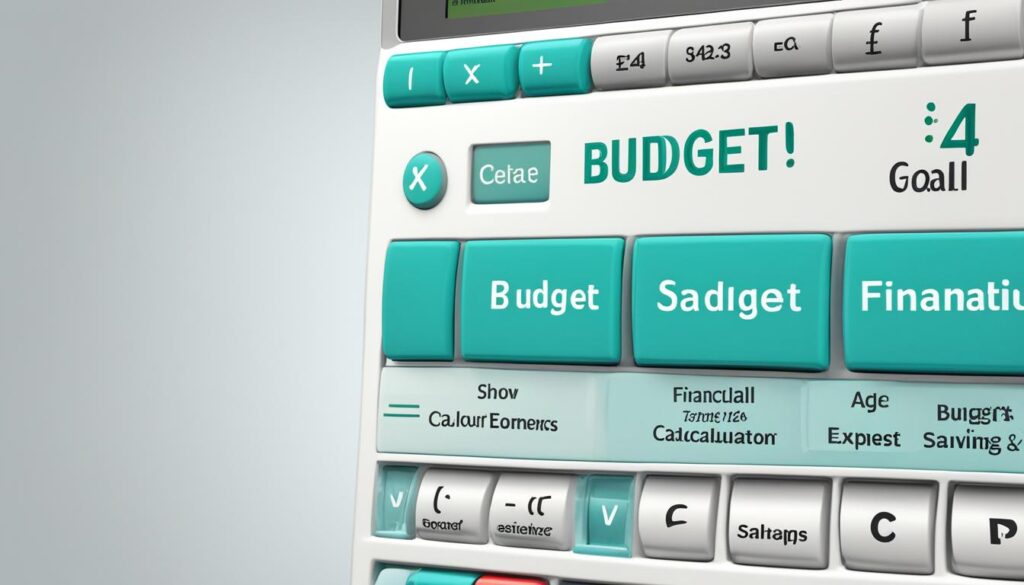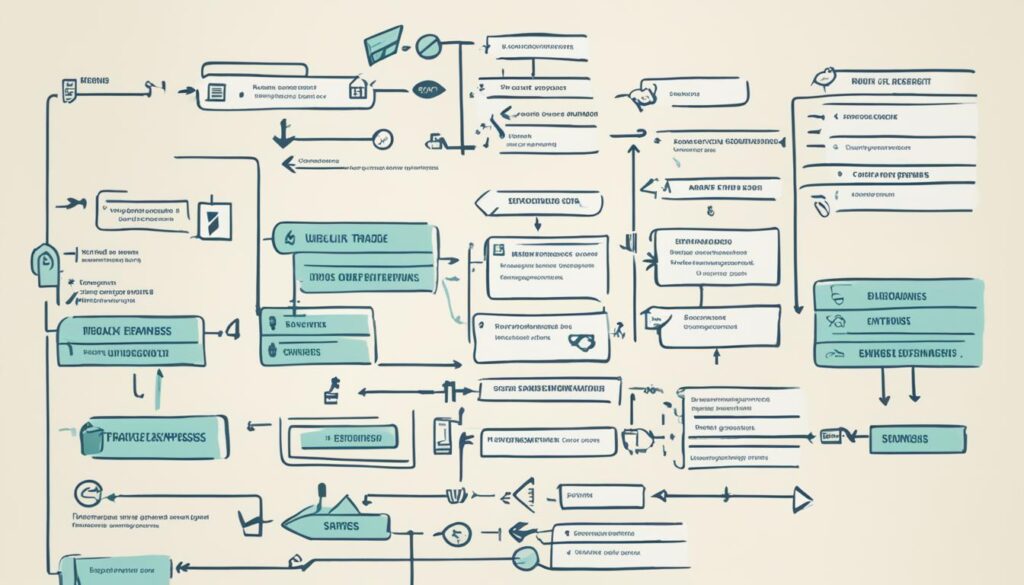Creating a realistic budget is key to managing your money well and hitting your financial targets. It empowers you to steer your finances and optimize your spending. By using advice from experts and customizing your budget to your life, you’re on your way to financial victory.

Key Takeaways:
- Creating a realistic budget is crucial for managing your finances effectively
- Tailor your budget to fit your lifestyle
- Set specific financial goals and track your progress
- Regularly review and adjust your budget based on your changing needs
- Use budgeting tools and apps to simplify the process
The Benefits of Budgeting
Budgeting is a key tool for handling your money and hitting your financial goals. It lets you monitor your finances, make smart choices, and aim for a stable future.
Track Your Expenses and Optimize Spending
Tracking expenses is a main advantage of budgeting. It helps you see where your money is going. This way, you can spot and cut down on unnecessary spending. Your cash flow gets better, focusing on what matters to you.
“A budget is telling your money where to go instead of wondering where it went.” – Dave Ramsey
Budgeting lets you set spending limits in areas like food, fun, or travel. This helps you live within your means and dodge debt. By watching your spending, you make thoughtful choices. This prevents binge buying that could mess up your financial plans.
Financial Planning and Goal Setting
A budget is crucial for detailed financial planning. It makes you weigh your earnings against expenses. Then, you can set achievable money goals and plan for later. Goals can vary from saving for a house, preparing for retirement, or clearing debt.
It’s vital to keep both short and long-range dreams in mind. Budgeting distributes your funds wisely. You’ll move closer to your aims while handling daily expenses.
Peace of Mind and Reduced Financial Stress
Without a budget, financial uncertainty and stress are common. Not knowing your income and outgo can be daunting. But, a budget brings calm by clarifying your finance scene.
With a budget, making money moves becomes easier. You know you’re aiming for your goals and staying true to your path. This order and control cut down on money worries. Thus, it lets you enjoy other life parts without fretting over finances.
The Benefits of Budgeting
| Benefit | Description |
|---|---|
| Expense tracking | Allows you to monitor and optimize your spending habits. |
| Financial planning | Enables you to set realistic goals and plan for the future. |
| Reduced financial stress | Brings peace of mind by providing a clear financial picture. |
| Control over money | Allows you to make informed financial decisions and stay on track. |
By keeping tabs on spending and optimizing it, budgeting brings many plusses. It maps out your financial journey towards your dreams. Adopting budget tips and methods means you are in charge of your finances. This lays the groundwork for a financially bright future.
The 50/30/20 Rule: A Simple and Effective Budgeting Method
When talking about money management and financial planning, it’s key to find a method that fits you. The 50/30/20 rule is a clear strategy many choose. It splits your after-tax money into three parts: needs, wants, and savings or debt repayment. This approach helps you manage your budget and take charge of your money.
According to the rule, 50% of your after-tax income goes to needs. These are crucial expenses you can’t skip, like housing, food, and utilities. Keeping these expenses at half your income lays a strong budget foundation.
30% of your income should then go to wants. This part covers things that make you happy, like eating out, movies, or shopping. This 30% lets you enjoy life while keeping financial duties in mind.
Finally, 20% should go towards savings or paying off debt. This helps you save for the unexpected, reach future goals, or reduce debt. Focusing on savings or debt repayment secures your future and targets long-term aims.
Elizabeth Warren, who came up with the 50/30/20 rule, explains it well: “View your income as a pie. Instead of dividing it equally, give specific parts to different financial areas. This makes sure everything is covered without leaving anything out.”
This rule is flexible, fitting many incomes and lifestyles. It encourages smart spending while allowing for current enjoyment and future plans.
To see how the 50/30/20 rule works, consider this budget example:
| Category | Percentage | Monthly Allocation |
|---|---|---|
| Needs | 50% | $1,500 |
| Wants | 30% | $900 |
| Savings/Debt Repayment | 20% | $600 |
If you make $3,000 after taxes each month, here’s how it splits: $1,500 for needs, $900 for wants, and $600 for savings/debt. This setup follows the 50/30/20 guideline accurately.
You can tweak these percentages to fit your situation. If your needs cost more, you might spend more there. Or, increase savings/debt repayment if that’s a priority for you.
Using the 50/30/20 rule can make a big difference in handling your money. It’s a straightforward way to balance your budget, reach your financial aims, and secure your money’s future.

How to Implement the 50/30/20 Rule in Your Budget
Managing your finances is easier with the 50/30/20 rule. It gives you a clear way to spread out your income. This ensures you keep your budget in check.
Calculating Your After-Tax Income
First, figure out your after-tax income. This is what’s left after taxes and deductions are taken from your pay. Knowing your net income lets you budget correctly.
Allocating 50% for Needs
Half of your after-tax income should go to needs. These are essentials like housing, food, and insurance. They’re vital for daily life.
Assigning 30% for Wants
Then, use 30% for wants. These are nice-to-haves like eating out or going on trips. This lets you enjoy life without hurting your budget.
Setting Aside 20% for Savings or Debt Repayment
Save or repay debt with the last 20% of your income. It’s key for emergencies, goals, or reducing debt. This secures your future financially.
Feel free to adjust the 50/30/20 rule as needed. More might go to needs or debts if they’re high. If possible, you may boost your savings or wants.
The 50/30/20 rule is flexible to fit your unique needs. It guides you to use your income smartly, focusing on financial priorities.

Example 50/30/20 Budget Allocation
| Category | Percentage | Amount |
|---|---|---|
| Needs | 50% | $2,000 |
| Wants | 30% | $1,200 |
| Savings/Debt Repayment | 20% | $800 |
In this example, $4,000 monthly income follows the 50/30/20 rule. $2,000 covers needs, with $1,200 and $800 set for wants and savings, respectively.
Using the 50/30/20 rule helps you manage money better. It ensures you spend wisely and reach your financial goals.
Other Budgeting Methods to Consider
While the 50/30/20 rule works well for many, there are other ways to budget. You might like the envelope system, zero-based budgeting, or the cash flow method. Each one offers a different approach to managing your money, based on what you need.
The Envelope System
Using the envelope system means dividing your cash for different spending areas. You put a set amount in envelopes for things like food, fun, and travel. When an envelope is empty, you’ve hit your spending limit there. This system makes you more aware of your spending habits.
It encourages careful budget use.
Zero-based Budgeting
Zero-based budgeting means planning every dollar you earn. You allocate funds for bills, savings, or paying off debt. The aim is to have no money left over. This method needs you to closely monitor and adjust your budget. It helps keep your finances in check.
The Cash Flow Method
This method matches spending with how you earn money. If you get paid every two weeks, you plan your expenses around each paycheck. This way, you manage your money better and avoid spending too much. It’s great for keeping up with your cash flow.
Look into these methods and see which one fits your goals and lifestyle. The secret to good budgeting is sticking with a plan that suits you.
Tips for Sticking to Your Budget
Creating a budget is the first step to financial stability. To truly succeed, you must build habits that make it easy to follow your budget. Here are some effective tips to keep you on track:
1. Track your expenses regularly
**Tracking your expenses** is crucial for knowing where your money goes. It helps you see where you can save money. Write down all you buy and check it often. This keeps you true to your budget.
2. Review your budget regularly
**Checking your budget often** helps you see if it’s working. Your life and goals can change. It’s key to match your budget with your current needs and what’s important to you.
3. Find accountability partners
**Having people to answer to** can push you to stick to your budget. Tell a friend or family member who you trust about your goals and progress. They can help you keep going and stay focused.
4. Automate savings
**Setting up automatic savings** is a smart move for reaching your financial targets. Arrange for money to go into your savings account every month. This stops you from spending it on other things.
5. Practice self-discipline
**Being disciplined** is critical for keeping a budget. Before buying something you don’t really need, wait a bit. This makes you think about if it’s really worth it. Consider if it fits with your money goals.
Remember, commitment and consistency are needed to keep to your budget. With time and effort, you can form good money habits and meet your financial goals.
Follow these tips and you’ll be great at managing money. You’ll be able to stick to your budget like an expert.

| Tips for Sticking to Your Budget | Benefits |
|---|---|
| Track your expenses regularly | Gain insights into spending habits |
| Review your budget regularly | Assess effectiveness and make adjustments |
| Find accountability partners | Receive support and motivation |
| Automate savings | Consistently save for financial goals |
| Practice self-discipline | Avoid impulsive purchases |
Helpful Tools for Budgeting
When budgeting, the right tools can really change your financial path. Technology gives us many apps, software, and online tools for budgeting. They help you manage your money better by tracking expenses, setting goals, and showing your progress.
1. Mint

Mint is a well-liked app for managing money. It lets you see all your bank accounts, credit cards, and bills in one spot. You can track what you spend, make budget limits, get bill alerts, and even receive tips to save money.
2. EveryDollar
EveryDollar, made by Dave Ramsey, uses a zero-based budgeting method. This means every dollar you make has a specific job. The app helps you build a budget and watch your spending. With it, adjusting your budget and understanding your spending is easy.
3. YNAB (You Need a Budget)
YNAB helps you stop living paycheck to paycheck. It encourages you to use last month’s income for this month’s expenses. The software syncs your accounts in real time, tracks goals, and has tools for reducing debt. It also provides learning resources and a supportive community for budgeters.
4. Personal Capital
Personal Capital offers more than just budget guidance. It helps you see the big financial picture by also looking at investments and retirement planning. You can link all your accounts to track spending, analyze investments, and get financial advice. This goes beyond budgeting to fully manage your finances.
These tools can make budgeting simpler and help you control your finances. With options like mobile apps, software, or online platforms, you can find the perfect tool for your financial needs. Choosing the right one can make your budgeting journey much smoother.
Importance of Setting Financial Goals
Having clear financial goals is key for effective budgeting. It gives your money management a purpose and direction. Saving for a house, paying off debts, or creating an emergency fund are all examples. These goals motivate you to keep your finances on the right path.
Setting milestones helps you stay focused. Tracking your progress lets you see your successes. This boosts your confidence and keeps you moving forward.
Financial goals guide your spending too. Knowing what you’re aiming for helps separate needs from wants. This leads to smarter spending that supports your long-term goals.
Moreover, having specific financial goals aligns your choices with your dreams. Be it a vacation, starting a business, or planning retirement, goals direct your financial health. They make sure you’re working towards what matters most to you.
Setting financial goals is like having a roadmap to your financial future. It gives you a sense of purpose and guides your financial decisions, ensuring you stay on track to achieving your dreams.
To start setting goals, first understand where you stand financially. Then, figure out what matters most to you. Mix short-term and long-term aims for a balanced approach. Break your goals into steps and set timelines to keep on track.
Remember, it’s about the journey, not just the endpoint. Enjoy managing your finances and learn as you go. With clear goals, you’re in charge of your financial destiny. This builds a strong base for lasting success.
Benefits of Using a Budget Calculator
Managing your money might seem hard, especially with budgeting. But, budget calculators make it easier. They help you control your finances better. Let’s look at why they’re so useful:
- Streamlined Budgeting: They let you put in your earnings and spending. This makes creating a detailed budget easy. You can keep track of your expenses and make sure you don’t go over your budget.
- Automatic Calculations: No need to do the math yourself. Budget calculators do it for you. They use the 50/30/20 rule or other methods. This saves you time and makes sure your plan is right.
- Visual Representation: They show your budget in graphs and charts. This makes it easier to see where your money is going. You can spot areas to improve and make your budgeting stronger.
- Goal Setting: You can set financial goals and see your progress. This keeps you motivated to reach your dreams. Whether it’s a vacation or clearing debt, these tools keep you on track.
Maximize Your Budgeting Efforts
“A budget calculator changes the game in managing money. It makes budgeting simple, does calculations for you, and shows where your money goes. Using one helps you make smart financial choices, reach your dreams, and build a secure future.” – Jane Smith, Financial Expert
Using budget calculators can really help you manage better. They let you plan your money smartly. Start using one now and see the difference it makes.

Importance of Tracking Expenses
Tracking your expenses is vital for budgeting success. You can record your spending manually or use apps. This lets you see your spending habits and find ways to save. Tracking regularly keeps you true to your budget and helps you make smart money choices.
By keeping an eye on your spending, you get to understand where your money goes. You can see your spending trends and find where you might be splurging. For instance, you might find you spend a lot on dining out. Recognizing this can help you adjust to meet your financial goals.
Many people use mobile apps to track their expenses. These apps link to your bank and credit cards, sorting your spending automatically. They even alert you if you’re going over budget. Mint, Personal Capital, and EveryDollar are some top app choices.
You can also track your expenses the old-fashioned way. Write them down in a notebook or use a spreadsheet. This method takes more effort but gives you direct control over your finances. It helps you feel more aware and in charge of your money.
The Benefits of Tracking Expenses
- Improved Money Management: It makes you think more about how you spend and encourages wise spending.
- Identifying Problematic Spending Patterns: You can spot where you’re spending too much and fix it to reach your goals.
- Accurate Budgeting: It helps you create a budget that truly reflects how you should use your money.
- Identifying Opportunities to Save: By looking at your spending, you can find ways to save and hit your financial targets quicker.
Whether you track your expenses by app or manually, the important thing is to do it all the time. Make a habit of noting your expenses often and check your financial progress. This will keep you responsible to your budget and help you make well-informed money decisions.
Keeping track of your expenses gives you a better insight into how you handle money. It allows you to tweak your habits to ensure you’re using your money best. You’ll feel more in charge of your finances and make choices that help you meet your financial dreams.

| Expenses to Track | How to Track |
|---|---|
| Housing | Keep receipts and bills, use budgeting apps to categorize expenses. |
| Transportation | Record fuel costs, parking fees, and public transportation expenses. |
| Groceries | Save grocery receipts and track food expenses. |
| Utilities | Keep track of electricity, water, and internet bills. |
| Dining Out | Record expenses from eating out or ordering takeout. |
The Key to Long-Term Budgeting Success
Long-term budgeting is more than just making a plan. It’s about sticking to it over time. For financial stability and reaching your goals, it’s key to have good money habits. It also helps to review and tweak your budget regularly.
Adding budgeting into your daily life helps you control your money. Start by tracking what you spend and checking your progress. Don’t forget to adjust how you use money when needed. Also, it’s important to revisit your financial goals often. Change your budget to keep moving in the right direction.
Staying disciplined and not giving up is vital for budgeting success over the long term. With careful planning and managing money well, you can manage your finances with confidence. Achieving your money goals is definitely possible.